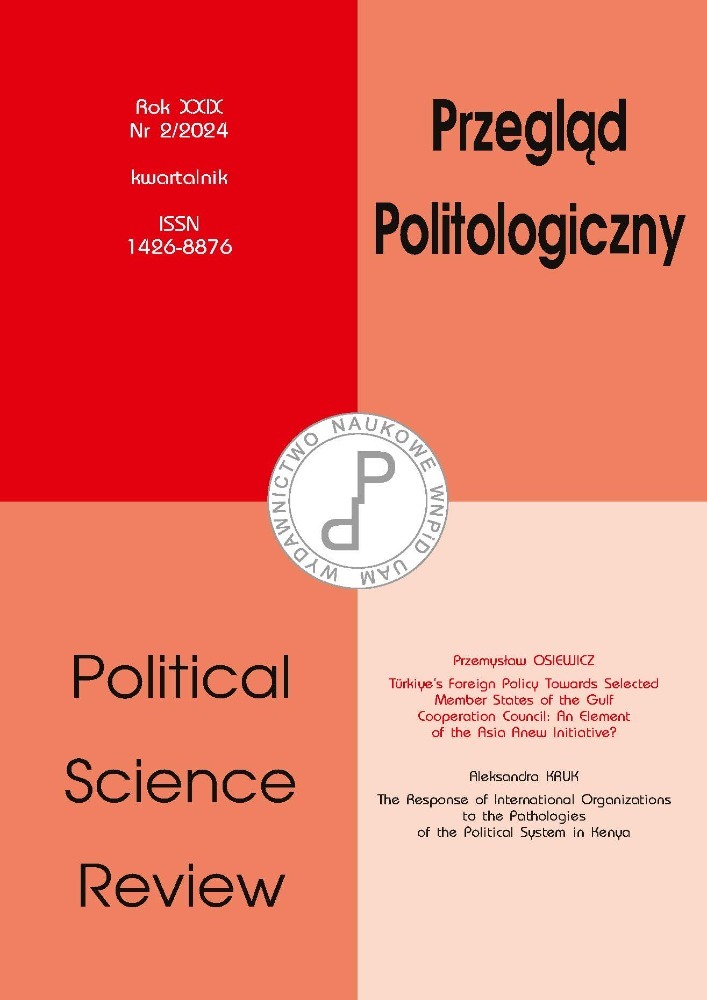Abstrakt
W artykule wskazuję, że popularne podejście Michela Sawarda do reprezentacji politycznej prowadzi do jej wyjątkowo problematycznego ujęcia jako potencjalnie przemocowej formy relacji politycznej. Korzystając głównie z doświadczeń teoretyczek feministycznych, argumentuję, że poza analizą mechanizmu „tworzenia roszczeń” reprezentacji konieczne jest także etyczne rozważenie możliwości i konsekwencji „łamania roszczeń”. Sytuacje, w których reprezentacja polityczna jest zrywana, ilustrują, jak nawet zinstytucjonalizowane formy reprezentacji często mają korzenie w emocjonalnych potrzebach konkretnych ludzi, które politycy cynicznie wykorzystują. Aby to zobrazować, wykorzystuję i krytycznie oceniam ogólny model wyjaśniający Sawarda, analizując przykład rezygnacji Donalda Tuska z funkcji Premiera Polski, aby objąć stanowisko Przewodniczącego Rady Europejskiej.
Finansowanie
Narodowe Centrum Nauki projekt nr 2017/27/B/HS5/00507
Bibliografia
Celis K., Childs S., Kantola J. et al. (2014), Constituting Women’s Interests through Representative Claims, “Politics & Gender”, vol. 10, no. 2. DOI: https://doi.org/10.1017/S1743923X14000026
Celis K., Childs S. (2020), Feminist democratic representation, Oxford University Press, New York. DOI: https://doi.org/10.1093/oso/9780190087722.001.0001
Cohen A. (2023), The inter-est between us: Ontology, epistemology, and the failure of political representation, “Contemporary Political Theory”, vol. 22, no. 1. DOI: https://doi.org/10.1057/s41296-022-00559-4
Crane P. T. (2006), ‘True Threats’ and the Issue of Intent, “Virginia Law Review”, vol. 92, no. 6.
Critchley S. (1999), The ethics of deconstruction: Derrida and Levinas, Edinburgh University Press, Edinburgh.
de Wilde P. (2013), Representative claims analysis: Theory meets method, “Journal of European Public Policy”, vol. 20, no. 2. DOI: https://doi.org/10.1080/13501763.2013.746128
de Wilde P. (2020), The Quality of Representative Claims: Uncovering a Weakness in the Defense of the Liberal World Order, “Political Studies”, vol. 68, no. 2. DOI: https://doi.org/10.1177/0032321719845199
Decreus T. (2013), Beyond Representation? A Critique of the Concept of the Referent, “Representation”, vol. 49, no. 1. DOI: https://doi.org/10.1080/00344893.2012.742455
Devenney M. (2019), The improper politics of representation, in: The Constructivist Turn in Political Representation, eds. L. Disch, N. Urbinati, M van de Sande, Edinburgh University Press, Edinburgh. DOI: https://doi.org/10.3366/edinburgh/9781474442602.003.0013
Disch L. (2015), The “Constructivist Turn” in Democratic Representation: A Normative Dead-End?, “Constellations”, vol. 22, no. 4. DOI: https://doi.org/10.1111/1467-8675.12201
Disch L. (2019), Introduction: the end of representative politics?, in: The Constructivist Turn in Political Representation, eds. L. Disch, M. van de Sande, N. Urbinati, Edinburgh University Press, Edinburgh. DOI: https://doi.org/10.3366/edinburgh/9781474442602.001.0001
Dovi S. L. (2007), The good representative, Blackwell Publishing, Malden. DOI: https://doi.org/10.1002/9780470754948
Fricker M. (2007), Epistemic injustice: Power and the ethics of knowing, Oxford University Press, Oxford. DOI: https://doi.org/10.1093/acprof:oso/9780198237907.001.0001
Guasti P., Geissel B. (2019), Saward’s Concept of the Representative Claim Revisited: An Empirical Perspective, “Politics and Governance”, vol. 7, no. 3. DOI: https://doi.org/10.17645/pag.v7i3.2103
Laclau E. (2005), On populist reason, Verso, London–New York.
Meardi G., Simms M., Adam D. (2021), Trade unions and precariat in Europe: Representative claims, “European Journal of Industrial Relations”, vol. 27, no. 1. DOI: https://doi.org/10.1177/0959680119863585
Montanaro L. (2012), The Democratic Legitimacy of Self-Appointed Representatives, “The Journal of Politics”, vol. 74, no. 4. DOI: https://doi.org/10.1017/S0022381612000515
Montanaro L. (2018), Who elected Oxfam? A democratic defense of self-appointed representatives, Cambridge University Press, Cambridge. DOI: https://doi.org/10.1017/9781108297721
Näsström S. (2006), Representative democracy as tautology: Ankersmit and Lefort on representation, “European Journal of Political Theory”, vol. 5, no. 3. DOI: https://doi.org/10.1177/1474885106064664
Näsström S. (2011), Where is the representative turn going?, “European Journal of Political Theory”, vol. 10, no. 4. DOI: https://doi.org/10.1177/1474885111417783
Noë A. (2004), Action in perception, MIT Press, Cambridge–London.
Phillips A. (1995), The politics of presence, Oxford University Press, Oxford.
Pitkin H. F. (1972), The concept of representation, University of California Press, Berkeley–Los Angeles–London.
Prezydent przyjął dymisję Rady Ministrów (2014), The official website of the President of the Republic of Poland, https://www.prezydent.pl/kancelaria/archiwum/archiwum-bronislawa-komorowskiego/aktualnosci/wydarzenia/prezydent-przyjal-dymisje-rady-ministrow,15454.
Rancière J. (1999), Disagreement: Politics and philosophy, University of Minnesota Press, Minneapolis–London.
Rancière J. (2009), The emancipated spectator, Verso, London–New York.
Saward M. (2006), The Representative Claim, “Contemporary Political Theory”, vol. 5, no. 3. DOI: https://doi.org/10.1057/palgrave.cpt.9300234
Saward M. (2010), The representative claim, Oxford University Press, Oxford. DOI: https://doi.org/10.1093/acprof:oso/9780199579389.001.0001
Saward M. (2014), Shape-Shifting Representation, “American Political Science Review”, vol. 108, no. 4. DOI: https://doi.org/10.1017/S0003055414000471
Saward M. (2020), Making representations: Claim, counterclaim and the politics of acting for others, ECPR Press and Rowman & Littlefield, London.
Schaap A. (2012), Critical Exchange on Michael Saward’s The representative claim, “Contemporary Political Theory”, vol. 11, no. 1. DOI: https://doi.org/10.1057/cpt.2011.42
Severs E. (2010), Representation as claims-making. Quid responsiveness?, “Representation”, vol. 46, no. 4. DOI: https://doi.org/10.1080/00344893.2010.518081
Severs E., Celis K., Meier P. (2013), Representative claims and beyond: A study of Muslim women’s inclusion in the Flemish headscarf debate, “Politics, Groups and Identities”, vol. 1, no. 3. DOI: https://doi.org/10.1080/21565503.2013.816633
Severs E., Dovi S. (2018), Why We Need to Return to the Ethics of Political Representation, “PS: Political Science & Politics”, vol. 51, no. 02. DOI: https://doi.org/10.1017/S1049096517002414
Steiner H. (1975), III–Individual Liberty, “Proceedings of the Aristotelian Society”, vol. 75, no. 1. DOI: https://doi.org/10.1093/aristotelian/75.1.33
Thomassen L. (2022), All Claims Are Representative Claims: Response to Thomás Zicman de Barros, “Representation”, vol. 58, no. 2. DOI: https://doi.org/10.1080/00344893.2021.1931952
Urbinati N. (2019), Representative constructivism’s conundrum, in: The Constructivist Turn in Political Representation, eds. L. Disch, M. van de Sande, N. Urbinati, Edinburgh University Press, Edinburgh. DOI: https://doi.org/10.1515/9781474442626-013
van de Bovenkamp H., Vollaard H. (2018), Representative claims in practice: The democratic quality of decentralized social and healthcare policies in the Netherlands, “Acta Politica”, vol. 53, no. 1. DOI: https://doi.org/10.1057/s41269-017-0040-6
Willis R. (2018), Constructing a ‘Representative Claim’ for Action on Climate Change: Evidence from Interviews with Politicians, “Political Studies”, vol. 66, no. 4. DOI: https://doi.org/10.1177/0032321717753723
Zicman de Barros T. (2021), ‘Not All Claims Are Representative Claims’: Constructing ‘The People’ in Post-Representative Movements, “Representation”, vol. 57, no. 4. DOI: https://doi.org/10.1080/00344893.2020.1853598
Zicman de Barros T. (2022), Making Claims with No Subjects: A Reply to Lasse Thomassen, “Representation”, vol. 58, no. 2. DOI: https://doi.org/10.1080/00344893.2021.1931953
Licencja
Prawa autorskie (c) 2024 Mateusz Zieliński

Utwór dostępny jest na licencji Creative Commons Uznanie autorstwa – Na tych samych warunkach 4.0 Miedzynarodowe.

